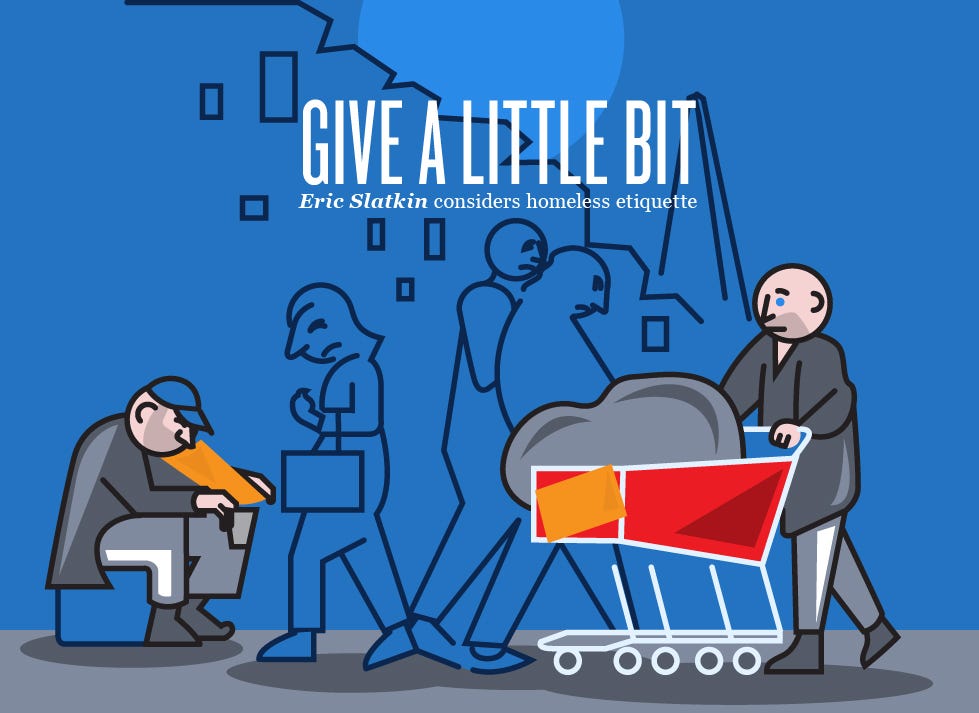

Fortunately, San Francisco has some of the best homeless programs in the country. From shelters to soup kitchens to Street Sheet, there is a strong support network.
But many of us wind up tuning out the homeless population completely — it’s sometimes hard to know who to trust. Should we be giving out that dollar? Making eye contact, saying hello? Stopping to make sure that passed-out guy lying on the ground is OK?
Below are a few of the most common responses, and some advice that will help you decide what to say, what to do, and when to just keep walking. At the very least, it’ll make you think as you walk by.
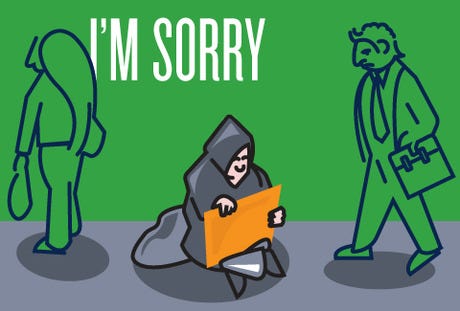
By far the most common reaction, this response can be broken down into two categories: with or without eye contact.
With eye contact
The only way to say, “I’m sorry” — from one human to another.
Without eye contact
An undeniably autopilot response. Teetering between apathy and antipathy, as you coast by texting and sipping your Gibraltar (to-go).

For many people (at least those who don’t wear extremely tight jeans), this act is often instinctual. As our fingers reach the inner lining of our pockets and we realize the implications of what we’re doing, we either come out bashfully empty-handed or fish out a dollar bill that survived the laundry. Either way, we’re either giving out of guilt, or we look like a jerk when we don’t actually give anything.
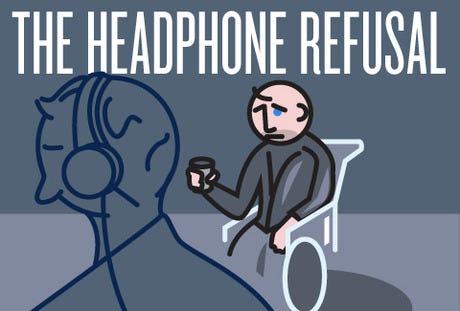
Headphones are a necessity in San Francisco. (How else are we going to listen to our Zunes?) And they’re sometimes useful in tuning out unwanted attention. Enough so that they even have a street name among the homeless: APDs (Anti-Panhandling Devices). No matter how loud your Beats by Dr. Dre get, you still have eyes, and acknowledging people with a nod as you breeze by isn’t the worst thing. Just be sure your music’s not so loud that everyone can hear the new Justin Bieber Christmas album you’ve been playing nonstop (sooo good).

You might have been to one or two meditation classes, but you’re no yogi, and normally would never be caught dead doing this. Some defend the action by saying it expresses empathy without being able to help. But really, it just looks smug, and it’s a tell card that you own a Prius.

Ours is a city that runs on alcohol, and a lot of bars don’t mess with cards. To get your Hamm’s, you need cash. So homeless people don’t believe you when you say you don’t have a dollar. Saying merely “I’m sorry” is less offensive. (Though it is surprising that with both the homeless and the tech element in this city there’s not yet an app to donate to homeless people, but I’ve got an idea — see below).
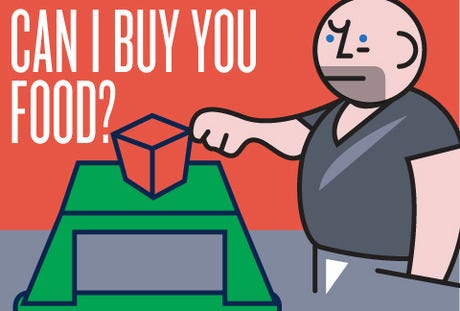
Whether you don’t trust that the money you give will be used for food, or you truly think it’s more helpful to just hand out those kilocalories, this is a common and complicated issue.
Probably more than any other city, the homeless population here has access to food, whether it’s at shelters or through food stamps. In this column on CHOW.com, Helena Echlin points out that the things missed are treats like cookies and doughnuts.
Rule: If the food doesn’t look desirable to you, it’s not going to look desirable to anyone else. Half-eaten hoagies in soggy doggie bags = fail. If you want to give leftovers at the end of your meal, cut off the portion you ate from.
There are also some programs like Replate, a simple concept started in SF that asks people to leave their leftovers on top of trash cans. (Although some argue this food sits out in the sun and becomes a bacteria factory.)
Another idea: If you’re walking into a food establishment and see a homeless person outside, ask what they want before you go in and hand it to them when you leave.

Think of this newspaper, by and about the city’s homeless, as a mutual friend who’s making an introduction. Though you might not want it, for the most part, if someone has Street Sheet, they are actively trying to better their situation. So it’s important to at least recognize the seller and chat with them if you can.

If someone’s trying to sell you something other than sanctioned programs like Street Sheet, chances are, it’s nothing you should take. Gift cards, MUNI passes, and those sidewalk flea markets of electronics — it’s best not to engage.

Years ago, when I was a recent resident, I was walking down the street with a coworker. A homeless guy stepped out into our path, looked her up and down, and asked if she had any change. Her response, “You know, change comes from within,” stopped him in his tracks.

Sure, giving out cigs to all your friends at the Uptown who “don’t smoke” can end up burning through your supply. But if you’ve got ’em, it’s a good alternative handout (and cheaper) than a dollar.

Whether it’s opening the door, hailing a cab, or squeegeeing your windows, these services, while not asked for, are (for the most part) gestures of trying to help. You shouldn’t feel guilty if you don’t give them a buck for holding the door for you, but at least say thank you.

Some people carry around gift cards for food establishments like McDonald’s, passing them out when asked for handouts. It’s more directed than giving money, and also leaves the person with choices of what they might want to eat.

It sounds surprising, but one thing homeless people need are socks. Think about it, you’re on your feet most of the day in the same pair. After three days or so, you inevitably get blisters, not to mention stinky feet. So giving a multipack of socks is a great help to someone on the street. And toiletries (check the travel section in Walgreens) are great as well, because they aren’t often handed out at shelters.
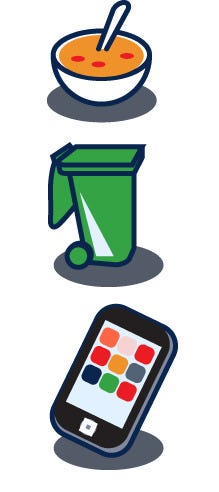


Volunteer by giving out food at a local soup kitchen or food bank. Here are a few good programs:
Martin de Porres House of Hospitality
San Francisco Food Bank
Glide
Missionaries of Charity — call for volunteering (415) 586–3449

Set up crates for glass bottles and dedicated receptacles for cans next to the trash cans in Dolores Park and other areas with heavy afternoon drinking (instead of the current mess that has to be sorted through).

Hey tech people, here’s an app idea: create a coupon app for local cafés that can be redeemed by a customer when also buying for someone in need. Interested? Go here.







